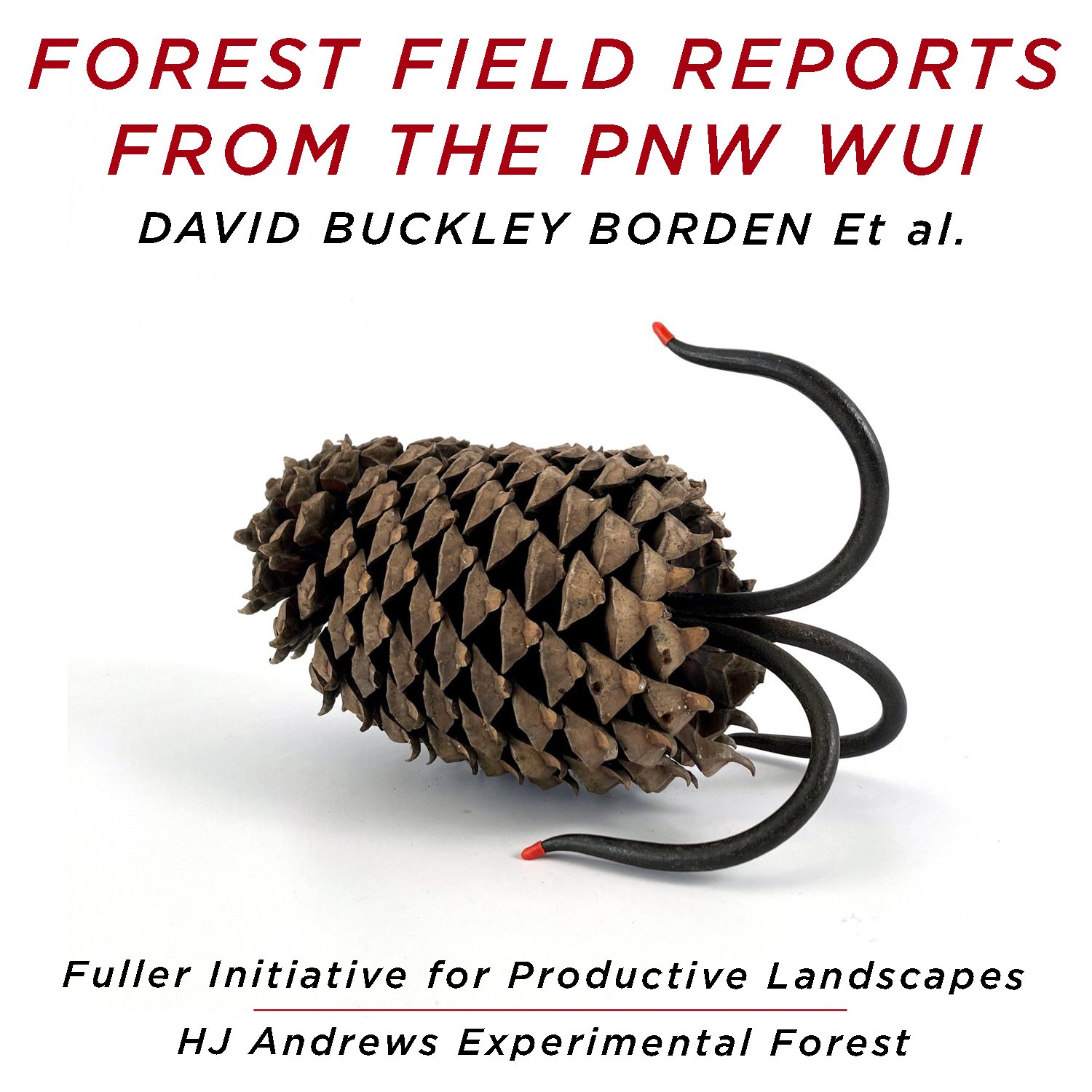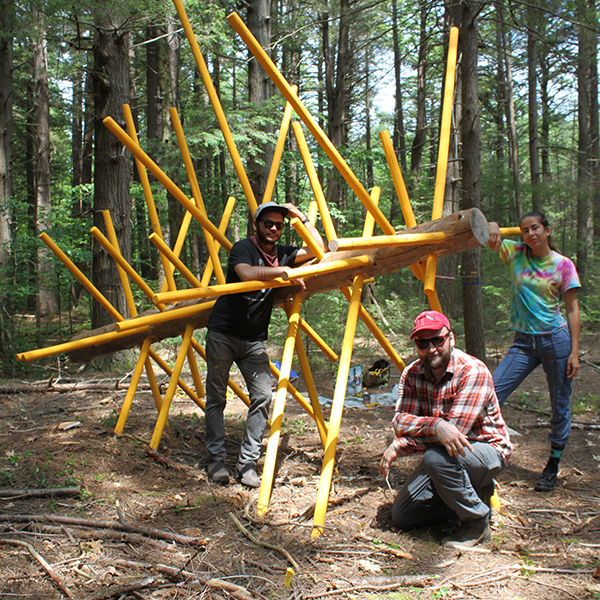David Buckley Borden’s public speaking is central to his interdisciplinary practice of creating art and design projects in service of educational programs, community-building, and direct-action agendas focused on environmental issues. David’s general-audience talks typically revolve around his unique landscape-based projects that communicate environmental issues through accessible, often humorous, hybrids of ecology, art, and design. Borden’s talks are intentionally created to appeal to a range of audiences within the fields of art, design, education, science, land stewardship, and conservation.
David has presented at venues ranging from local libraries to professional conferences to leading research universities. Borden’s recent hosts include Alliance for the Arts in Research Universities, New Directions in American Landscape Conference, Boston Society of Landscape Architects, Reed Hilderbrand Landscape Architecture, Spring Creek Project at Oregon State University, Rhode Island School of Design, Savannah College of Art and Design, Harvard Graduate School of Design, Harvard Graduate School of Education, Maine Audubon, and the Schoodic Institute at Acadia National Park.
Interested in hosting a talk or workshop? Please email Borden@fas.harvard.edu for availability and rates. Sixty minute, half day, full day, or keynote programs are available. In addition to the following talks, David welcomes the opportunity to develop custom presentations for specific needs and interests.
Upcoming talks for 2025 include the following hosts: the Seminariruum at the University of Oregon, the Bloedel Reserve, Scape Landscape Architecture, and the Landscape Architecture Foundation.
Forest Field Reports from the WUI
David Buckley Borden’s Forest Field Report talk focuses on his latest environmental-design collaborations with the HJ Andrews Experimental Forest and the Harvard Research Forest. This general-audience lecture focuses on David's unique landscape-based projects that communicate environmental issues through accessible, often humorous, hybrids of ecology, art, and design. In this talk David shares his research-driven creative process and fluid collaborative approach to environmental-communication at the intersection of landscape and cultural event. The image-rich presentation includes a series of project case studies including the PNW Tree ID project, Arboreal Goth Collection, Warming Warning Walk, and Hemlock Hospice. Through these examples, David advocates for new models of interdisciplinary environmental education by focusing on joyful solutions to the practical convergence of community, ecology, and design.
Typical length: 1 hour, including 15 minutes for discussion.
Forest Fashion; Visual Culture and Production of Space
Co-presenters: David Buckley Borden and Liska Chan
Forest Fashion; Visual Culture and Production of Space explores the practical intersection of ecology, art, and design through the lens of a maker-based environmental-communication project developed at the Fuller Initiative for Productive Landscapes at the University of Oregon. This co-authored talk by David Buckley Borden (Fuller Design Fellow) and Liska Chan (Director, Fuller Initiative for Productive Landscapes) explores “Forest Fashion,” a speculative landscape-futures collaboration inspired by the HJ Andrews Experimental Forest. This critical creative work explores the unfolding Anthropocene at the confluence of culture and ecology within the forests of the Pacific Northwest. Through a narrative accompanied by images of clothing, bags, water bottles, map cases, and camp furniture made by members of the collaborative, we interrogate the interdisciplinary approach to environmental communication at the junction of creativity, education, and landscape-ready fashion. The lecture demonstrates how ethos, shaped by the visual culture of fashion, impacts the production of space in a precarious age.
Hybrid Vigor; Art X Design X Ecology
The Hybrid Vigor talk is focused on Borden’s environmental-communication projects from the complementary perspectives of art, design and ecology. Borden shares his research-driven creative process and his interdisciplinary approach to environmental communication at the intersection of landscape and cultural event. Borden presents case study projects including Hibernaculum at Boston’s Innovation and Design Building, Hoosic Expedition in North Adams, and Hemlock Hospice at the Harvard Forest.
Typical length: 1 hour, including 15 minutes for discussion.
Place-based Data Viz: Tips, Tricks, Grand Totals, and other Traps
This co-authored talk by interdisciplinary designers Tera Hatfield and David Buckley Borden focuses on the artful presentation of information for narrative effect. The co-presenters challenge audiences to re-imagine data visualization rules and traditions as a means to develop culturally-compelling visual narratives for place-based projects. Borden and Hatfield's radical cartography, infographics, data-driven sculptures, and art installations are not driven by typical strategic communication conventions, but rather the integration of visual art and design to reposition data as an engaging narrative medium. This talk builds on Borden’s work as a designer-in-residence at the Harvard Forest and Hatfield's recent visually rich publication, “Seattleness: A Cultural Atlas.”
Typical length: 1 hour, including 15 minutes for discussion.
COMMUNITY NATURE; PEOPLE, PLACE, AND PRACTICE
Community Nature: People, Place, and Practice is a general audience talk about the use of community-driven art projects within the interdisciplinary environmental stewardship movement. The talk begins with a brief overview of contemporary arts-science practice models and then considers Borden’s recent work through the lens of mission-driven community art projects. Case-studies include Borden’s Harvard Forest work, the Triple Decker Ecology exhibition at the Somerville Museum, his MASS MoCA residency project, Hoosic Expedition, and Data Decision Trees community collaboration at Penn State. Borden frames the projects as an advocation for interdisciplinary collaborators to move beyond simply building environmental awareness and makes a case for community-driven art projects with clear direct-action agendas.
Typical length: 1 hour, including 15 minutes for discussion.
Professional Plots; HIGHS, LOWS, SWAMPS, AND OTHER HOTSPOTS
This professional development talk is for students and recent graduates and uses Borden’s career track as an example of developing an intentional self-directed creative practice. The talk is not a prescriptive “how-to” career presentation, but an empowering, yet cautionary, conversation about creative growth and self-determination. The conversation includes Borden’s initial work in the performing arts, his brief experiment as a corporate landscape designer, his tenure as a “feral landscape architect,” and his current practice as an independent creative working at the intersection of art, design, and ecology. Borden walks the audience along his career path to highlight the strategic successes that have shaped his practice philosophy, process, and project outcomes. Borden also presents setbacks and learning opportunities including practical pitfalls of public installations and exhibitions, residencies, fellowships, grants, and self-made opportunities.
Typical length: 1 hour, including 15 minutes for discussion.
Novel ECOSYSTEMS
Co-presenters: David Buckley Borden and Dr. Aaron M. Ellison
Artist-scientist talk by artist David Buckley Borden (Associate Fellow at the Harvard Forest) and Dr. Aaron Ellison (Senior Ecologist at Harvard Forest). This lecture focuses on the practical convergence of ecology, art, and design through the lens of their art-based science-communication collaborations developed at Harvard University. The talk explores two recent projects, Warming Warning and Hemlock Hospice. Warming Warning, a public art project at Harvard University, combined environmental design and science communication to convey global climate-change data and spur action. Hemlock Hospice, a year-long, art-based interpretive trail at the Harvard Forest, told the story of the loss of eastern hemlock, while addressing larger issues of climate change, human impact, and the future of New England forests. The presentation illustrates the team’s collaborative approach to science communication at the intersection of public art, education, and direct action.
Typical length: 1 hour, including 15 minutes for discussion.
Enviro Sign Making Workshop
This workshop is a hands-on learning experience for a general audience with limited creative skills, or students of art and design. The two-hour workshop presents a creative framework for participants to develop their own environmental signs on paper. The introductory graphic arts workshop addresses audience, messaging, form, type, color, and creative process from inspiration to finished detailed sign. The ecological content is flexible and can be adjusted for program goals and learning objectives of host organization.
Typical length: 2 hours
Visualizing Landscape Futures
This talk explores a variety of creative approaches to visually communicate landscape futures with imagination and cultural resonance. The image-rich presentation builds off Borden’s recent interdisciplinary experience with the Landscape Futures Scenario Lab at the Harvard Forest and visualization work on food futures with the MetaLAB at Harvard’s Berkman Klein Center for Internet and Society. Case studies and examples range from conventional digital-collage visualizations to speculative industrial design products to critically explore potential landscape futures.
Typical length: 1 hour, including 15 minutes for discussion.
Rad Bad Map
The Rad Bad Map workshop focuses on the creation and presentation of radical cartography for narrative effect. This hands-on workshop challenges audiences to re-imagine traditional graphic map-making tools as a means to develop compelling visual narratives for place-based projects, be they design research, proposal, critique, or productive prompt within a public forum. These arguably “bad” maps are not driven by spatial accuracy and cartographic convention, but rather the integration of images, symbols, and other cultural cues to reposition the map as a high-impact narrative medium for compelling graphic communication. This workshop builds on Borden’s ongoing practice of creating “NTS maps” as evident in his cartography-driven Greater Yellowstone Ecosystem and Wild West at Bodega projects.
Typical length: 2 hours









